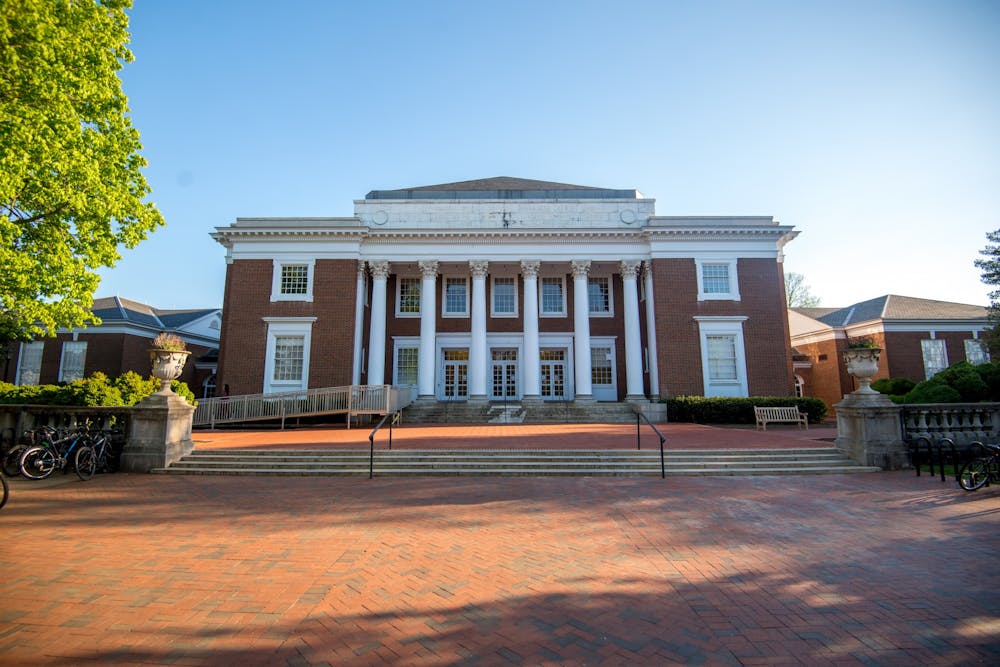This semester — unlike any other in the University’s history — has been characterized by change after change. A delayed return to Grounds, evolving COVID-19 restrictions and hybrid and online classes have all demanded that students and faculty members be exceptionally adaptable over the past 15 weeks. In this final stretch of the semester, modifications to the traditional exam schedule pose no exception to this trend.
Unlike past years when courses ended in early December, all in-person instruction ended before Thanksgiving break this semester. Students were asked not to return to Charlottesville after the last day of classes Nov. 24 in an attempt to minimize travel and the spread of COVID-19. As a result, all final exams and assessments will be administered virtually.
For Lynn Uzzell, adjunct lecturer of American Political Tradition, and the students of her in-person seminar class, this change is especially pronounced. Most of her 18 students are first years who — for the most part — took their first and only in-person midterm at Gilmer Hall earlier this semester. The midterm was a closed-book, in-class essay where Uzzell selected questions from a previously provided list. For the final exam, however, Uzzell recognizes that it’s necessary to modify this format since she won’t be able to proctor it in person.
“The way I handle the final — and I think that this is the best way — is not even to pretend that this is going to be an exam like any other in the classroom,” Uzzell said. “That’s why I plan to make the final exam open-book.”
Since the students will be allowed to access their notes during the final, Uzzell is opting not to provide them a list of essay questions like they received before the midterm. This change helps mitigate potential Honor violations such as pre-writing answers, although Uzzell worries that it may put undue strain on many of her first-year students.
“The study guide is intended to give [the students] some reassurance so that they already know what's going to be on the test and how to make the most of their study time,” Uzzell said. “But because they are on their own for studying [for the final exam], I fear that this might lead to greater anxiety for some students.”
Eliza Cart, first-year College student and member of Uzzell’s American Political Tradition class, acknowledges that open-book exams are not inherently easier and still require adequate preparation.
“[Open-book exams] aren’t super helpful when it comes to classes that involve a lot more independent thought, like American Political Tradition,” Cart said. “That class takes a lot more studying and analysis rather than just regurgitation of fact.”
In comparison to the midterm, Cart anticipates it will be more difficult to find time to study for the final exam due to the commitments that will arise when she returns home.
“When I’m home, I’ll be driving my siblings to school every day, working a job and helping my mom with housework,” Cart said. “I also live in a relatively small, enclosed household where it can be hard to find quiet alone time … I worry how these things will affect my ability to study.”
Uzzell recognizes that students face challenges like these when taking exams from home, having personally experienced problems with internet connection herself during last spring’s online classes.
“At the beginning of [this] semester, I mentioned to my students that we're all dealing with strange circumstances,” Uzzell said. “If they have home environments which make it difficult, the only thing that I can ask is that they let me know and we can work out some possible alternatives.”
Beyond any complications that may arise from being at home, however, students also consider how their academic performance is impacted by being away from the physical environment of the University.
“In the fall of my first year, I remember walking into an econ exam at Maury Hall and just feeling really nervous,” second-year College student Zach Garfinkel said. “But when taking a different, higher level econ exam from home last spring, I wasn’t worried at all — I just turned on my computer and did it. So there's definitely a lot less pressure [with at-home exams].”
While Garfinkel acknowledges that the relaxed climate of at-home final exams could benefit some students, he personally feels that the pressure of taking a final on Grounds keeps him motivated to study and stay engaged during exams.
“I perform better on Grounds rather than at home,” Garfinkel says. “It just feels like ... there's something at stake. When you're at home, the pressure isn’t really there … That pressure definitely helps me perform better.”
Cart echoed this sentiment, expressing that the climate and people on Grounds helped keep her engaged during the semester.
“Coming [to Grounds], it’s been really easy to keep up my work ethic just because there’s such a culture of working hard,” Cart said. “All of my friends here are very passionate and driven, so we’re always keeping each other motivated.”
With this semester’s final exams taking place away from the motivating environment of Grounds, however, both Cart and Garfinkel have plans to maintain their academic performance by relying on other means.
“I’m hoping to set a schedule for myself where I can allocate a couple of hours in the morning to study and then have the rest of the day to help out with my family,” Cart said. “I think that will help me prepare [for finals] as best as I can from home.”
Garfinkel, hoping to lean on his University community from afar, suggests that social support is key to persevering through at-home finals.
“Keeping in touch with friends, especially when we’re not on-Grounds together, helps me stay sane during exams,” Garfinkel said. “This semester, especially, it’s never been more important to check in on the people around you during finals.”







